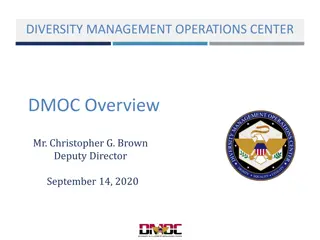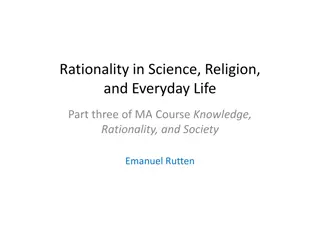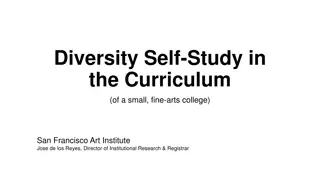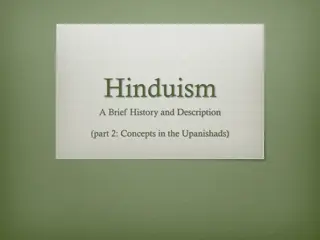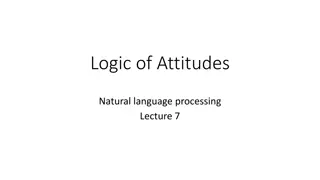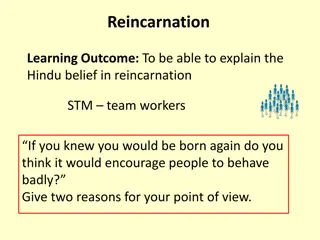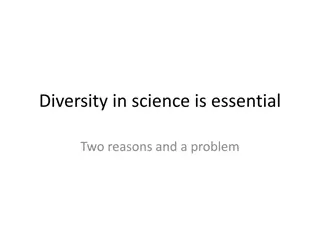Diversity of Belief in Karma Concept
Karma, a fundamental belief in many religions, dictates that one's actions determine their future outcomes. Buddhists especially emphasize the importance of karma, with good deeds leading to positive experiences and bad deeds resulting in negative consequences across lifetimes. The concept is akin to sowing seeds, where good actions yield good fruit and bad actions yield rotten fruit. Karma is seen as a natural law, not a system of punishment or reward by a deity. Buddhists believe in the cycle of Samsara, where past actions influence current and future lives, shaping one's destiny. Through compassion and kindness, individuals can foster good karma, while negative intentions like greed and hatred lead to adverse karmic effects.
Download Presentation

Please find below an Image/Link to download the presentation.
The content on the website is provided AS IS for your information and personal use only. It may not be sold, licensed, or shared on other websites without obtaining consent from the author.If you encounter any issues during the download, it is possible that the publisher has removed the file from their server.
You are allowed to download the files provided on this website for personal or commercial use, subject to the condition that they are used lawfully. All files are the property of their respective owners.
The content on the website is provided AS IS for your information and personal use only. It may not be sold, licensed, or shared on other websites without obtaining consent from the author.
E N D
Presentation Transcript
Understand and evaluate the diversity of belief in different religions Arrange your ideas into paragraphs Explain what is meant by the word karma . Explain why Buddhists believe Karma is important and what will happen to people who perform good karma, compared to people who perform bad karma.
Karma is a word that many people believe in. They think that the actions that we do will affect us: If we do something good, then something good will happen to us. If we do something bad, then something bad will happen to us. Karma: the result of a person's actions as well as the actions themselves
Buddhists use a metaphor of fruit to explain karma: If you sow a good deed, then you will get good fruit, however if you sow a bad deed then you will get rotten fruit.
Buddhists believe that we lead many lives, and come back as different people or different animals in each life. This continual cycle of life and death is called Samsara. They believe that if we were bad in a previous life, then our current life will be full of misfortunes. However, if we were good in a previous life, then we will have lots of joy and happiness in our current life. Buddhist prayer wheel One story tells that the Buddha's cousin tried to kill him by dropping a boulder on him. Although the attempt failed, the Buddha's foot was injured. He explained that this was karmic retribution for trying to kill his step-brother in a previous life. When prayer wheels are turned, the prayers written on them are sent out into the universe Karma determines where a person will be reborn and how they will live in their next life. Good karma can result in being born in one of the heavenly realms. Bad karma can cause rebirth as an animal, or torment in a hell realm. Samsara: the continual cycle of life and death. misfortune: bad luck karmic retribution: punishment for bad actions in the past torment: something that causes extreme suffering
Actions that lead to good karmic outcomes are based upon compassion and kindness. The opposite motives of greed, hatred and delusion lead to bad karmic results. Karma is not a system of punishment or reward dealt out by a god but is more accurately understood as a natural law similar to gravity. Buddhists believe we are in control of our ultimate fates and the purpose of Buddhism is to take conscious control of our behaviour. The Tibetan Buddhist depiction of the wheel of life depicts the six realms of existence that all sentient beings cycle through from one lifetime to another.
What does karma mean to Buddhists? Arrange your ideas into paragraphs Explain what is meant by the word karma . Explain why Buddhists believe Karma is important and what will happen to people who perform good karma, compared to people who perform bad karma. Challenge: What kind of things can someone do to perform good karma? Key vocabulary karma actions Buddhists metaphor reincarnation reborn misfortune heavenly realm
Model: Karma Karma is a word that many people believe in. It means our actions and the consequences that come from these. Buddhists believe that we lead many lives and come back as different people or different animals in each life (Samsara). Furthermore, they believe that our actions in this life affect how we live in our next life. For example, if you perform good karma, or perform good actions, in this life, you will be rewarded but if you perform bad karma, or perform bad actions, you will be punished in your next life. Buddhists believe that we are in charge of our own karma and it is up to us how we behave towards others. To practise good karma, Buddhists make sure that they are generous and kind to others.
Remote Learning Tracking Click on the link below to let us know you have completed the lesson. https://forms.office.com/Pages/ResponsePage.aspx?id=eCY4lN73r0G0 KV1rDWITzRhTQ2IZqpBOsW8cFVoooF9UNVlMS1dCVkdaM0k0WlhFT E9WVFBTWEg1Ti4u



